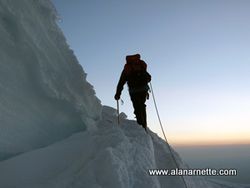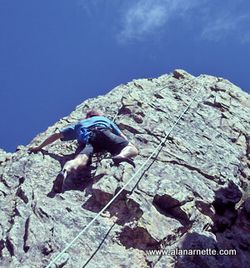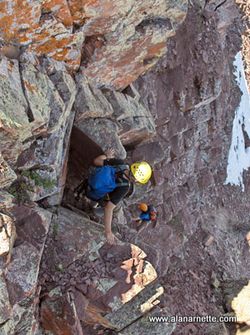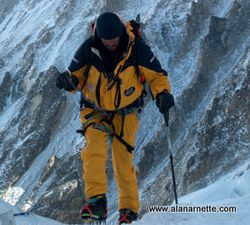The most often asked question of anyone who does a dangerous or unique undertaking is “Why?” My altimeter watch shows that I have climbed over 500,000 vertical feet, 90,000 on Everest expeditions alone. I must like it! Today, I climb to raise Alzheimer's awareness and research funds but also I climb for other reasons. Here is my clumsy attempt to answer the question for me:
Why do you climb? An age-old question first publicly asked in the 1920s of George Mallory during his attempts on Everest. His incredibly complex or dismissive answer was “Because it is there.” Similar to mine and no less understood by strangers, acquaintances, friends and some family.

Climbing captures the allure and mystery of life for me. First there is the peacefulness of being high on a mountain as the sun peaks around the Earth. Then there is the camaraderie of friends being roped together as they work up a mountain, not as individuals but as a team. Finally, there is the challenge of taking a step on a steep slope knowing that a mistake could be deadly but the next step will be rewarding.
After six weeks of climbing up and down the Khumbu Icefall, Western Cwm and Lhotse Face, I leaned heavily on my right knee. My headlamp showed pure white snow at my foot – a sharp contrast to my bright yellow boots. I felt another wave coming over me. I gagged once again and struggled for breath. Even with my oxygen bottle turned on, I was having serious difficulties at 27,200' on Mt. Everest. After a quiet discussion with myself, I turned around to return to the South Col and Camp 4. My 2002 summit of Everest would have to wait.
A test of my body or of my mind?

I once heard that adventure is defined as when you are doing it you pray to get you out alive and once it is over you pray to do it again.
Alaska, the Granite Range, 1999, Howie and I are almost up the couloir when we hear the telltale CRACK of ice breaking. We instantly fall to the snow, plant our ice axes, cover our heads and hold on to each other. The fall passes and we acknowledge the danger with a smile. It was a small “water-fall” avalanche that covered us with ice, snow and rock. Twenty minutes later, another covers us and Howie looks at me with the unspoken question to which I respond “Let's go down.”
Danger seems to drive the adrenaline that keeps us going. Maybe this is a commentary on the lack of excitement in our everyday lives. While watching the soccer game or band concert brings family satisfaction, it is often what we do for ourselves that brings personal satisfaction.

My life is a balance of three areas: family, work and myself. I try to focus on each area while not ignoring another area. I find that when I get out of balance, my overall happiness suffers as does the other areas. My personal time is focused on climbing, today.
Mountains test your “essence”. They bring out your best and your worst. They are completely unforgiving, impersonal and answer to no higher authority. When you agree to climb one of these high mountains, you declare formally or informally how to dispose your body upon death. This exercise makes declaring beneficiaries simple.
August 1997, Cathy and I are sitting on our patio and discussing my “body disposal” assuming the worst for the upcoming Cho Oyu expedition. I have the legal form on the table for both of us to read. The choices: 1) bury on the mountain, 2) cremate in Katmandu or 3) return to your home. By the way, choices 2 and 3 are conditional upon being able to get your body off the mountain – highly unlikely in the vast majority of the cases.
Why does someone go on these expeditions knowing what you know? Many people I have met on these expeditions are very successful in life already. Almost everyone has the full support of the closest family members. For me this is without question and gives me strength. So why risk EVERYTHING for a mountain summit?

I read the message on New Years Eve 2003, David Hiddleston had died on Mt Tasimen in an avalanche. My friend and my guide on Ama Dablam and Everest was gone. Doing what he loved. His friends and family, in their grief, expressed their understanding.
Lying in the medical tent with an IV in my arm, I think about the last six days, the last six weeks. Everest had been hard, very hard. I was suffering from a bacterial lung infection and dehydration. I was glad to be back in base camp after a two day ordeal from the Balcony. No regrets, no self-absorbed pity party – at least at that time. Get to Katmandu and then Colorado and then maybe I could reflect on the experience. Consider what had happened, what I learned and what next. Attempt peaks a lower altitude. Go after more technical mountains? Maybe rock climb the locals. Canada, there a lot's of mountains there! Or should I stop climbing while I am still alive?
June 2006. At 20,800' on Broad Peak I am having the best day and the worst day. The snow under my crampons is soft yet solid. The views of K2 and the Godwin-Austin Glacier are mind-blowing. I see my friends ahead and behind me and draw comfort from their company. However, deep inside, I know it is over. The body is not right. The risks too high. Time to come home. Before …
I wrote in a dispatch from Broad Peak “… as I prepare to go up the Hill, I ask for all your positive energy for me and my teammates. Wilco and Gerrard are making their bid tonight. More climbers tomorrow and more later. We will move from camp to camp higher up the Hill and make the final bid from Camp 4. The whole process will take 4 or 5 days. This is why we are here. This is when the test really begins. There are a thousand reasons to stop and only a few to push on. And those are personal and unique to each climber. Please accept our love of mountaineering. Please accept our result regardless of what it is. Please know that this is what makes us alive, it is the fuel that drives us on an individual level …”
So, Why? Is the answer to reach the ever-higher altitudes on earth? Or is climbing simply a way of seeing how far you can take yourself? The brutal honesty it forces? The clear understanding of the consequences? The bonds developed when life is simplified? The insight that personal growth is accelerated when you push? Or is it just because?
Climb On!
Alan